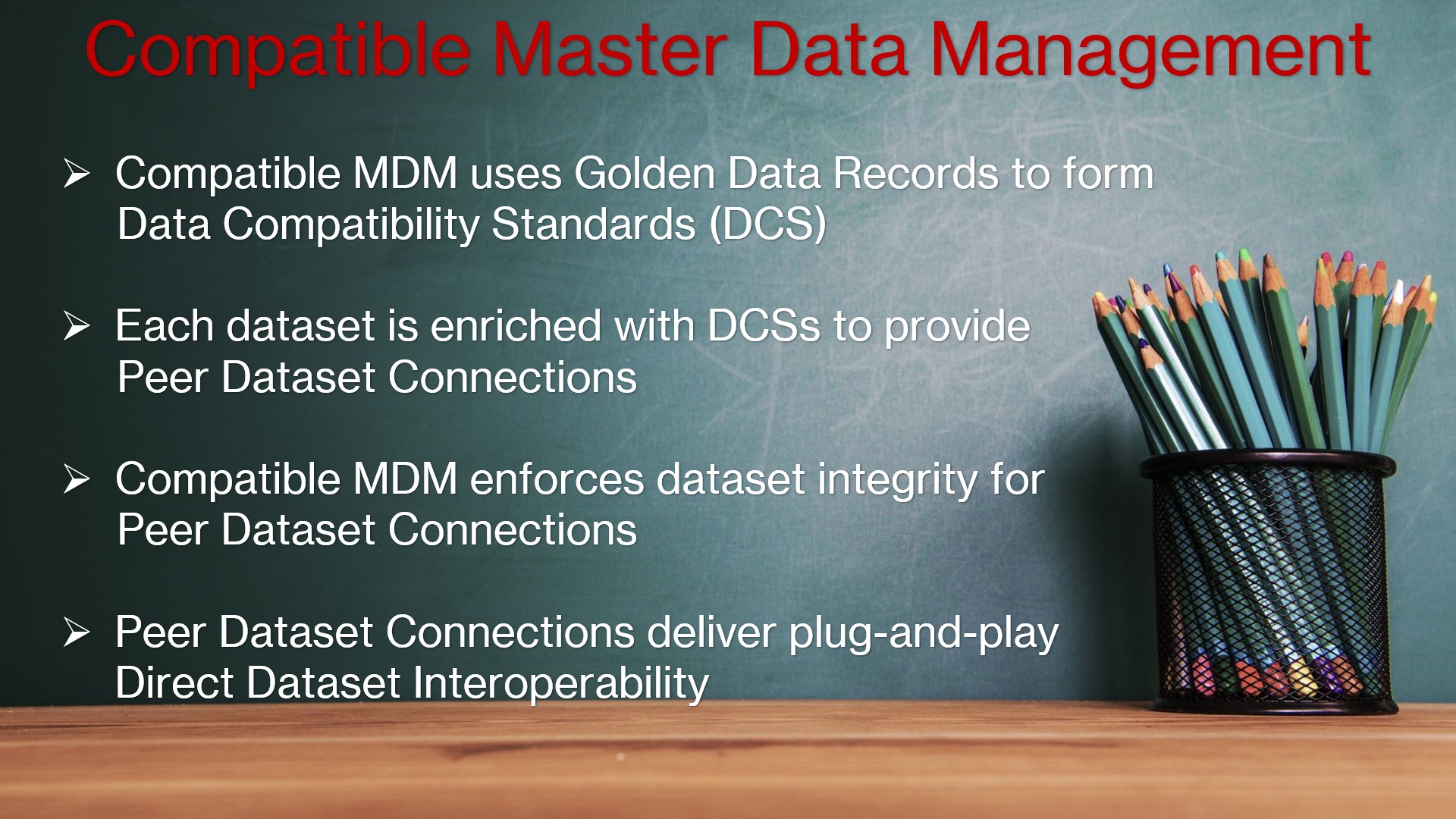Compatible Master Data Management Introduction
Compatible Master Data Management (MDM) is an enhanced MDM delivery method that noninvasively enriches existing datasets to become Compatible Datasets. With this MDM delivery method, the MDM Golden Records are used to form and maintain reusable Data Compatibility Standards. Existing disparate siloed datasets are then enriched with the Data Compatibility Standards to become Compatible Datasets. These Compatible Datasets are analytics-ready modular plug-and-play datasets that seamlessly collaborate, on demand, to provide any data and information required.
Once datasets are properly enriched to be compatible, there is no longer a need for data integration, data warehouse, or data fabric projects as that dataset functionality is already designed into the compatible datasets. Not only does Compatible MDM provide dataset functionality not possible with disparate datasets, but Compatible MDM is faster, better, cheaper, more reliable, and far more scalable than traditional MDM methods.
Compatible MDM Golden Data Records
Traditional MDM allows companies to consolidate and access master data-related information previously spread across incompatible datasets. Data may be consolidated, curated, and stored as a Golden Data Record within the MDM dataset. Then what? With traditional MDM the data is sometimes used in target datasets to provide clean data content. Is that the best that can be done with the huge investment in time, effort, and money?
With Compatible MDM, the curated Golden Data Records are used to fabricate Data Compatibility Standards. These standards are used to enrich the source datasets making them directly interoperable. Not only do the source datasets now have direct data access to the Golden Data Records of the MDM dataset, but the source datasets become directly interoperable with each other.
Compatible MDM has a tremendous impact. Each compatible dataset is enriched by the Data Compatibility Standards and becomes a consistent analytics-ready modular plug-and-play dataset. Data can be seamlessly combined on demand across compatible datasets that are now indistinguishable from a single data warehouse.

Compatible MDM and the Compatible Data Fabric
A fascinating thing happens with compatible datasets because of their direct dataset interoperability. These compatible datasets spontaneously form a Compatible Data Fabric. A set of MDM-generated Data Compatibility Standards encapsulates each compatible dataset making the dataset a modular plug-and-play component of a Compatible Data Fabric. Unlike the classic monolithic data fabric, the Compatible Data Fabric is comprised of interoperable plug-and-play analytics-ready modular datasets. The Compatible Data Fabric becomes your data architecture without data transformations and no more data integration hairballs.
Maxxphase Data Compatibility Standards don't just end within your organization, either. When other organizations employ the same Data Compatibility Standards, their datasets are now compatible with your datasets. Companies in the same industry that use the same data compatibility standards can seamlessly share and combine data and information, supporting extended collaboration, and improving cooperation industry-wide.
When data suppliers use the Maxxphase Data Compatibility Standards their Golden Master Data Records data may be used to directly enrich your organization’s master data. Your customer accounts' master data can be integrated with real-time credit scores and banking information from third-party vendors, for example. This real-time information sharing enriches your master data, improving the contextual insights your company receives simply by conducting business as usual. Compatible data suppliers may also open the door to effective customer prospecting in their compatible master data. The possibilities are unlimited with datasets that are directly interoperable.
Master Data Directly Links Compatible Datasets
Our research has shown that disparate datasets are siloed as they simply lack master data commonality. We found that consistent master data commonality allows us to combine data content across multiple datasets which cannot be done with siloed datasets. This seamless linking of data across compatible datasets is direct dataset interoperability. While traditional MDM is useful for data quality improvements, it fails miserably to resolve this master data commonality issue.
Fortunately, Maxxphase solves the data silo issue by simply and noninvasively adding the required master data commonality to each dataset in the form of MDM-generated Data Compatibility Standards. Existing golden data record content is utilized to generate Data Compatibility Standards which now enforce data integrity across physical datasets. All standardized compatible datasets feature direct dataset interoperability where any data from compatible datasets can be seamlessly combined as needed by the business.

